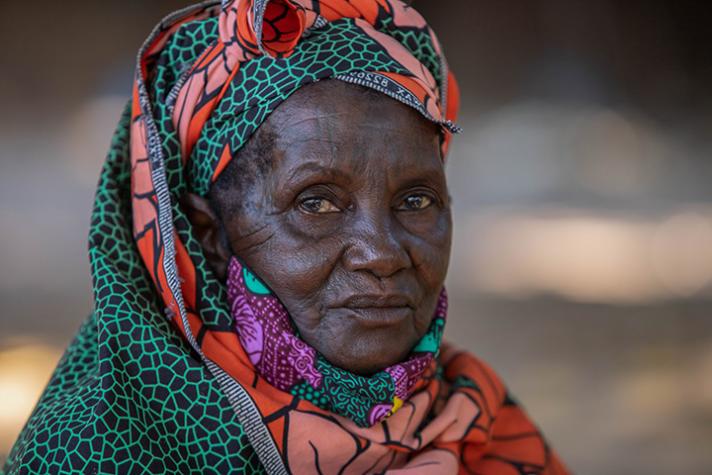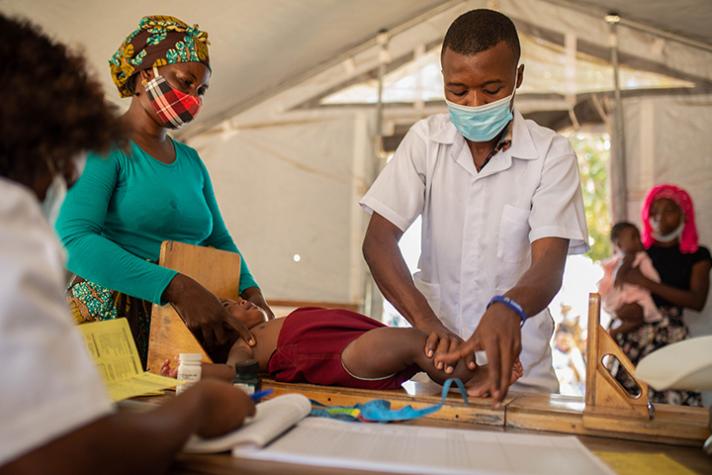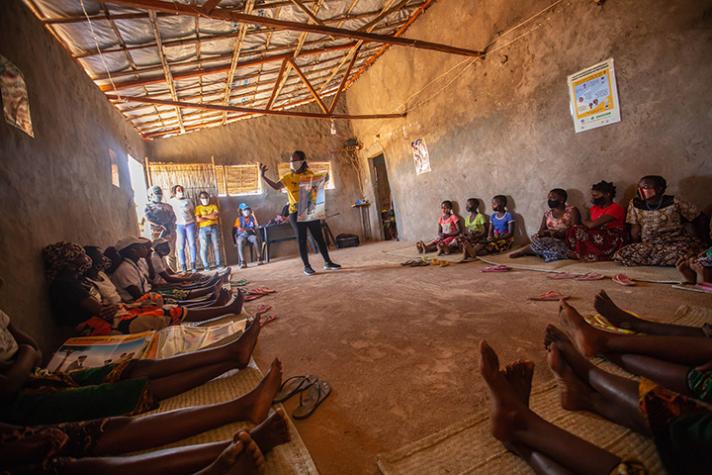Almost 800,000 people have been displaced by an ongoing insurgency in the northern Mozambican province of Cabo Delgado, nearly half the population of the province. Some 175,000 of them have found refuge in and around the province’s capital of Pemba.
With EU humanitarian funding, aid agencies provide basic humanitarian assistance, including the rehabilitation of health centres and schools. We have committed nearly €17 million in 2021 alone to address some of the most basic needs for the displaced and local host communities.
“First we fled into the bush when Al Shabab attacked our village”, explains Jifa Nguile who is over 70 years old. “But my sons then helped me and my granddaughters to flee first to Macomia and then to this place near Pemba, where we feel much more secure.”
She lives in a hut made from bamboo and mud with a simple plastic sheet as a roof. Although this is not much, she can take care of herself and her granddaughters.
The insurgency, which started some 3 years ago, has killed over 3,000 people and displaced hundreds of thousands, some even more than once.
As we visited the area, in October 2021, 117 families who had fled an attack on their village just a few days before, were receiving emergency packages including food for 2 weeks, hygiene products and cooking utensils.
Jifa Nguile managed to escape the violence. She has found shelter near Metuge. © European Union, 2021 (photographer: Alfredo Zuniga/Factstory)
According to the head of the World Food Programme (WFP) operations in Pemba, Cristina Graziani, aid agencies have seen a dramatic rise in the population in need: “Just over a year ago, we supported some 30,000 people”, she explains.
“Now we are dealing with the needs of over 750,000 displaced in the province. More have sought refuge in neighbouring provinces. The lean season is now approaching. It is a critical time for the rural communities as they await the harvest.”
Rehabilitating schools and health stations
Many of the displaced have also settled in the city of Pemba itself, hoping to find casual work and access to education and health. But this has also placed a tremendous strain on the local health and education services, already struggling to provide for the existing population before the crisis.
For the International Committee of the Red Cross (ICRC)'s Health Program Manager in Pemba, Emilio Mashant Tshiteng, one solution has been the rehabilitation of 3 community health stations in Pemba.
With EU humanitarian funding, the Mahate Health Station is now completely refurbished, well stocked with medicines, and has dedicated local staff.
“This project benefits both the displaced and the local community as they now have access to this improved facility”, he explains. “The needs are tremendous with the staff dealing, at times, with nearly 1,000 consultations per day, mainly cases of malaria and paediatrics.”
The refurbished primary health care centre benefits both thousands of IDPs and people from the host communities.
© European Union, 2021 (photographer: Alfredo Zuniga/Factstory)
Given that more than half the displaced are children, access to health services for their children is only one challenge for parents: education is another.
At the “Natite” primary school, in a crowded residential area in downtown Pemba, a dozen 8-year old boys and girls in their blue and dark blue uniforms are hunched over rickety wooden school desks, slowly writing down their ABCs in their notebooks.
For over a year, their school had been closed due to COVID-19. Now they are eager to be back and play with their friends again.
The school was already providing basic education to over 3,000 children and has had to make space for an additional 660 from the displaced communities. With EU humanitarian support, the Italian NGO 'GVC-WeWorld' offers remedial and catch-up classes for kids from both communities.
“Some of the kids were away from school so long they have forgotten some of their basic ABCs,” explains Agnacio Vermis, one of the informal teachers working for GVC-WeWorld.
“After the long closure of schools we discourage absenteeism by offering these special classes, assisting children with their basic literacy and numeracy.”
But school is not only a place for learning. “We provide a host of after-school activities such as volleyball, board games, dancing,” explains Mara Unfer, head of the GVC-WeWorld Pemba office.
“This helps reduce tensions between local and displaced kids but also helps protect them from anti-social activities such as child labour, early marriage, or drugs. We can identify signs of social and mental issues amongst the children much earlier and provide assistance.”
Picture: Children from the displaced families and host communities can participate in remedial classes to catch up on their ABCs and basic numeracy. Due to the pandemic, schools remained closed for nearly a year.
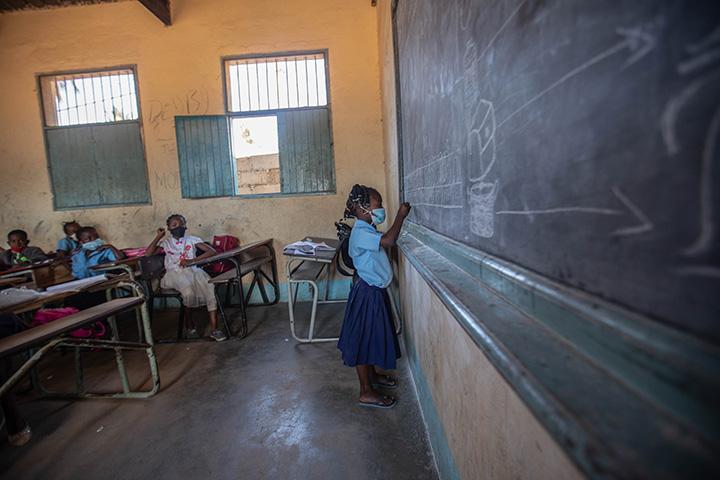
Protecting displaced people
Addressing protection issues is also one of the main concerns of the UN Refugee Agency (UNHCR) in the settlement camps around Pemba and Metuge.
With the help of the community and using local materials, UNHCR has constructed “protection houses”, allowing their qualified staff and partner organisations to provide confidential counselling to victims of gender-based violence, or advocate against child marriages, while also training community volunteers on such issues.
“The stressful situation and basic needs that the displaced people face often leads to domestic violence or other issues such as child marriage, as parents hope to reduce the pressures on the family,” explains Elisa Fernando Tembe, a psychiatrist working for the Italian NGO “Doctors with Africa” (CUAMM).
“I get mothers with girls as young as 11 years old pleading for help because the father is trying to marry off the girl in return for food or some basic goods.”
The trauma of the violence and displacement and the difficulties of living in the resettlement sites weighs heavily on the minds of the displaced people. Many still have intermittent contact with friends and relatives still living near their home villages, making the longing for return even greater.
Picture: Elisa provides counselling to women and girls who have experienced violence. Many displaced have been deeply traumatised by the violence and subsequent displacement.
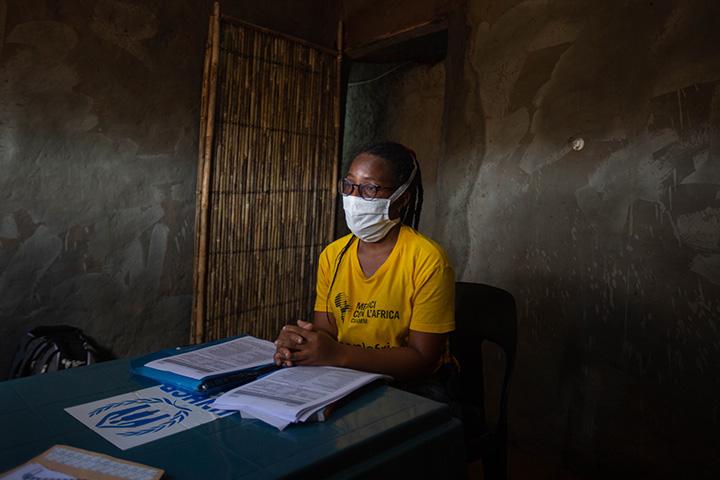
“I still have contact with my sons who decided to stay near our village”, explains Jifa Nguile. “They have small farms which were our only livelihood. We long to return but we are scared.”
Young volunteers from the displaced communities receive training in providing information to their fellow displaced on issues of gender-based violence and early marriage. They can advise victims to seek advice from trained staff of the various NGOs.
© European Union, 2021 (photographer: Alfredo Zuniga/Factstory)
Story by Mathias Eick, Regional Information Officer, Great Lakes and Eastern and Southern Africa, EU Civil Protection and Humanitarian Aid Operations.
Last updated: 08/11/2021


